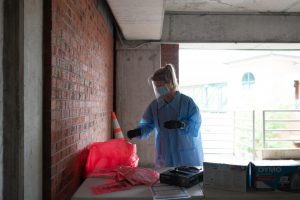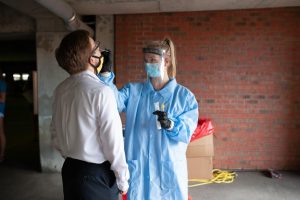EDITORIAL: Students, administrators, we’re calling on you to stop COVID-19 in Boone – it’s a matter of life and death
October 9, 2020
On Sept. 28, App State sophomore Chad Dorrill died because of complications caused by COVID-19. The next day, Chancellor Sheri Everts sent an email sharing details of Chad’s death and offering condolences to the App State community.
An email isn’t enough.
Any student death is an extraordinary circumstance, but we’re living in extraordinary times. Chad’s death calls for an extraordinary response.
The Appalachian Editorial board calls on our university and our peers to do more – to ensure that Chad’s death wasn’t in vain.
App State has made national headlines in the New York Times, CNN and CNBC. But, it’s not the kind of attention that our students and faculty wanted or deserve.
As of Oct. 8, App State reported that 794 students, 36 employees and 41 subcontractors have tested positive for COVID-19 since March.
There have been 196 cases of COVID-19 reported in the last week alone – almost 22.5% of the total cases reported in the past six months.
Since July, the university has reported 19 coronavirus clusters, and 10 of those have occurred in residence halls. The campus dorm clusters account for 79 total cases. Three athletics teams account for 81 cases — 63 cumulative on the football team — while Greek life accounts for 53 cases.
Our students are scared. There’s a general feeling of uncertainty on campus: are we going home? Are classes getting moved online? What happens if my roommate gets sick?
These worries are only worsened by what feels like a lack of transparency from the university in late-night email announcements and administrators who are challenging to get a hold of.
Administrators claim to be doing work “behind the scenes” to benefit their students, but what we really need is honesty and communication because, after Chad’s passing, it’s clear that lives are at stake.
Weekly emails from the chancellor asking us to “remain vigilant” aren’t helpful, comforting or inspiring.
But, the university isn’t the only one to blame.
Students: we don’t live in a bubble. We live in a town where families raise their children. We live in a place where people of all ages go to work and live their lives even when we aren’t here. We live in a community where 12 people have died due to COVID-19 complications since the first death in September. What we do affects our Boone neighbors, too.
Hosting and attending huge parties is out of the question. So is heading to a crowded bar. We need to resist the fear of missing out and look out for our peers and neighbors instead.
Chad was just like any of us. He was young, healthy and active. Just because you don’t feel personally at risk, doesn’t mean you aren’t putting others in harm’s way with your choices.
Chad’s death is not normal, and we shouldn’t be acting like it is.
Organizing homecoming events and putting more responsibilities on students who are overworked and overwhelmed to begin with isn’t the answer. Celebrating gameday like we used to isn’t either.
Both the university and students need to do better. If Chad’s death wasn’t enough of a wake-up call, what will be? Will it be when your roommate is too sick to get up? When you infect your grandparents with COVID-19 on a weekend visit?
One of the most special parts about our university is the “Appalachian spirit,” a phrase our chancellor uses often. This spirit reminds us that the only way past this pandemic is through it. Students’ social habits and the university’s secrecy are not going to bring us to the other side in one piece, like we’ve seen with Chad’s passing.
The virus is devastating our country, our campus and our community. The only way to stop it is to work together, hold each other accountable and be honest.
Students, get comfortable with being uncomfortable. Undoubtedly, you know people who are actively going out, not wearing masks, and so on. Call out your friends. Share with them how important it is to slow the spread. Pick your friends wisely, and stick with them. Avoid hanging out with people who are actively going to parties or bars. Make informed, responsible choices.
Still aren’t convinced? Then take it from Chad’s family:
“The family encourages everyone, especially the thousands of students living on and off college campuses around the country, to please isolate if you test positive for COVID-19. Wear your mask. Chad is our WHY.”
App State, be there for your students. Through information, resources and personal connections, you can create a meaningful difference in the student body’s trust in you and their receptiveness to your communications.
Put mental health in the spotlight: advertise campus resources better, consider a semester plan with days off spread throughout rather than a traditional spring break, consider an optional pass/fail system to help students struggling with classes during COVID-19. If all students got tested, rather than retroactively testing after discovering residence hall clusters, the burgeoning spread could be rapidly contained.
Do better in honor of Chad, and let’s make sure we don’t have to grieve the loss of a life in our community due to the virus again.














Concerned parent • Oct 11, 2020 at 12:02 am
Excellent editorial. Kudos to the writer and research team.
Prayers for Chad’s family and the ASU & Boone communities during this challenging time of Covid.
John • Oct 10, 2020 at 7:44 am
Awesome! If we could have voices like this addressing how people are ignoring the fact that the riots and looting among the left likely spread the majority of the virus, we’d really get somewhere.
Susan • Oct 10, 2020 at 5:14 am
Very well written!
Jim Harmon • Oct 9, 2020 at 10:37 pm
I am quite shocked and also frightened. I am in the most vulnerable group and my spouse has a comorbidity condition. How do we stay away from the people who do not conform to the mandated and sensible protective measures for them and us? When the ASU opened our numbers were much less scary. Within one month we (Watauga County residences) were faced with a sudden increase in active cases and our local hospital is filling up. Our local hospital is opening a third covid ward. Can they open a fourth, etc? Is it a DUH? 20,000 new residence and a sudden rise in numbers? Students have, in a short time, have proven their stupidity and irresponsibility. Will the University face this issue or still chase the money that keeps ASU open?
Stephen Waits • Oct 9, 2020 at 1:29 pm
We need more voices like this. Your student voices matter, you are the customers in the business that is higher-ed. The administration must listen to you, for everyone’s safety. And thank you sincerely for taking into account the other populations in Boone that don’t necessarily revolve around the university. I wish the ASU administration could show the same courtesy.
MuChao • Oct 9, 2020 at 12:52 pm
Very well-written, y’all. So glad to see students standing up and demanding answers from this abominable administration.